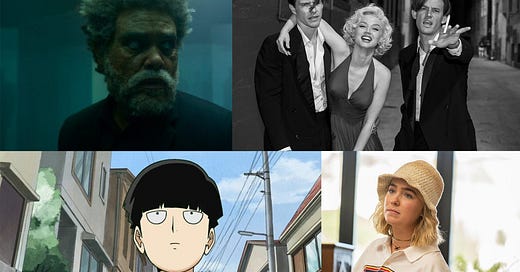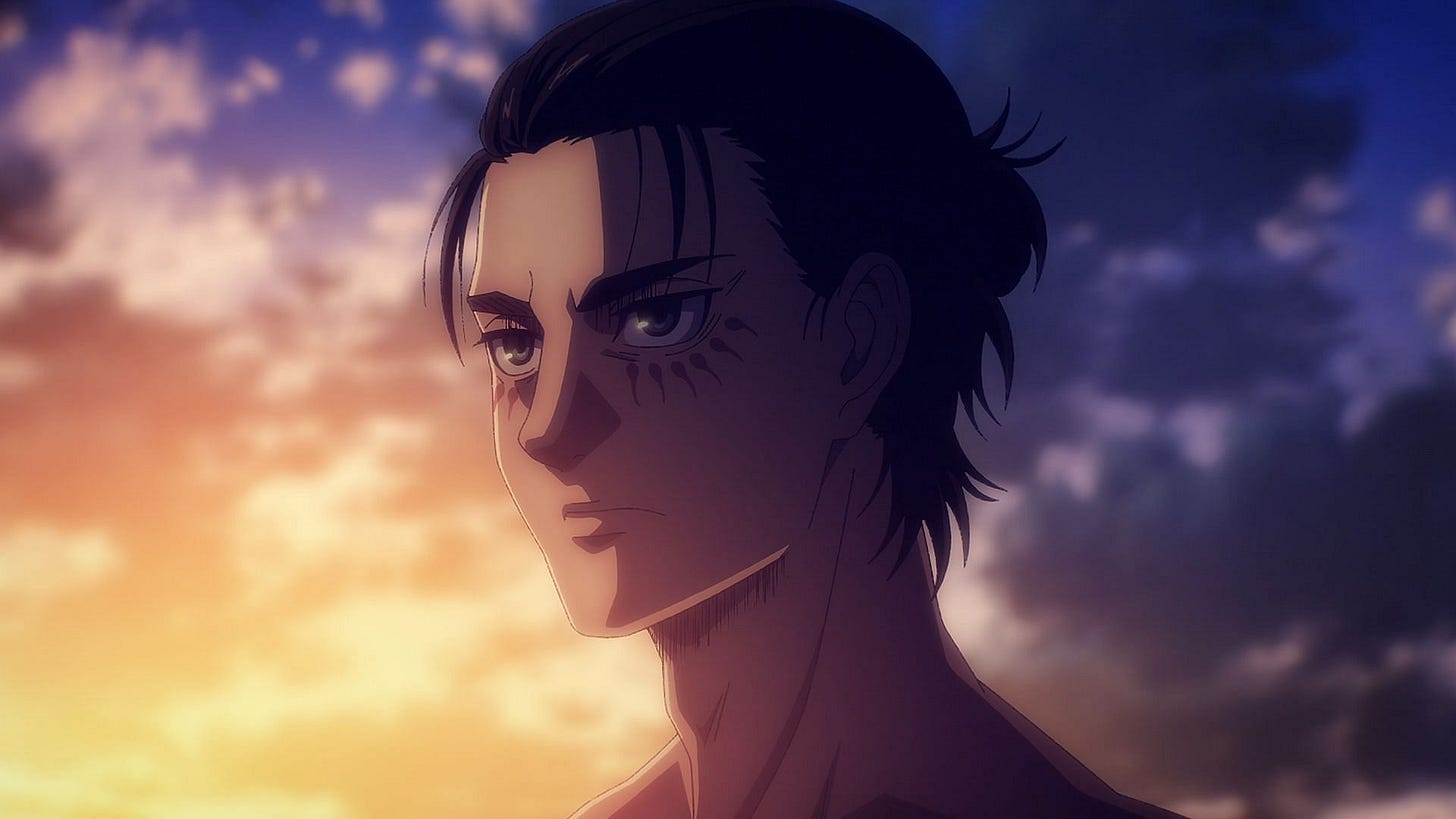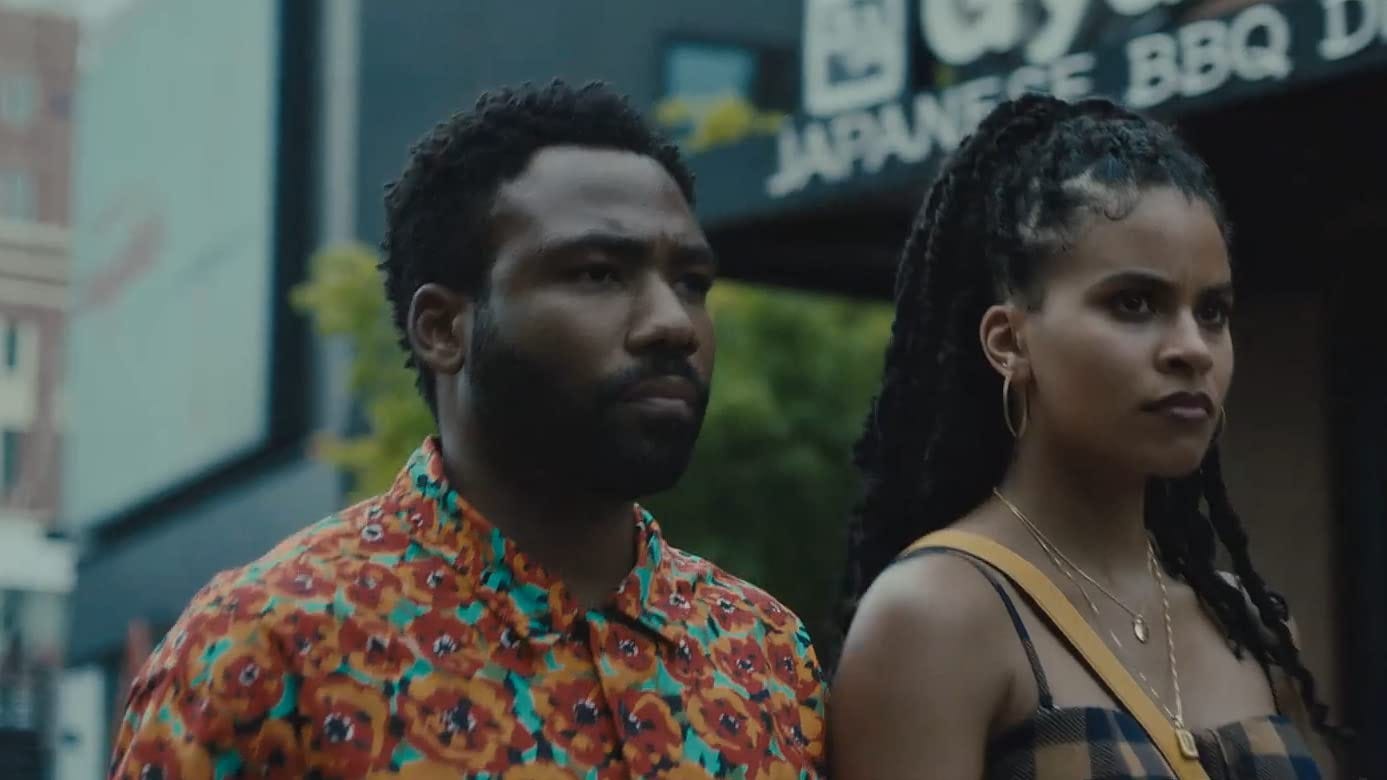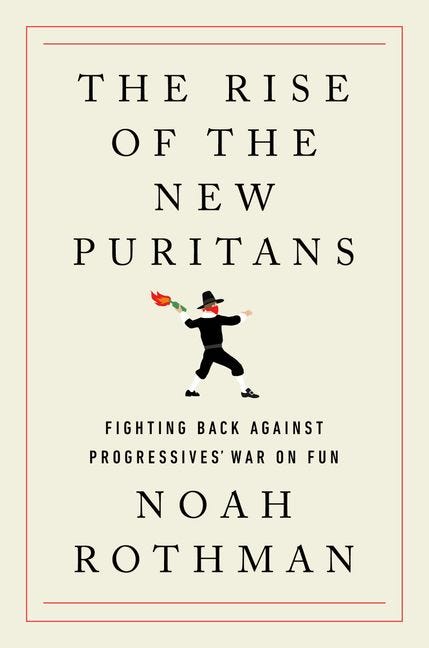2022 In Review: These Are My Favorite Things
From anime to film, here's a summary of what I've really enjoyed.

Anime
If there was a word that would summarise what I’ve been watching in 2022, it would be diversification. This is the first year that I’ve dived into anime, which seems underappreciated, despite being one the biggest forms of media in the world. I’ve seen a few anime from its Golden Age in the late 20th century, from Studio Ghibli to Satoshi Kon, and have watched Evangelion and Cowboy Bebop, two masterpieces of the form, but I have never been devoted to it, being aware of its unique fan culture that otherwise stigmatises Japanese animation to any outsider.
This wasn’t until I watched Attack on Titan, that my eyes opened up to the broader aspects of the form. It’s an anime operating on a rather simple premise - human soldiers battle against a bunch of giant humanoids called Titans - that devolves into something rather deeper about the human condition and its relationship with freedom, a theme that is associated with the militarism of the show, but also the show’s (anti)-hero Eren Yeager, whose motivation to kill all Titans directly stems from seeing one eat his own mother. Attack on Titan is one of the most popular shows in anime, because it is also incredibly addictive, revolving around big and intense moments where humans battle against the titans and try not to get eaten. Come for those moments, and stay for the utter sadness of the situation. Needless to say, it was an immersive experience that I hope to write about its complexities more deeply at some point.
Elsewhere, I have caught up with Mob Psycho 100, a shonen, written by One - the mangaka behind One Punch Man - about a preteen nicknamed Mob who tries to control his psychic abilities with Reigen Arataka, who profess to be a top psychic, but doesn’t have any powers. Like Attack on Titan, Mob Psycho 100 has visually stunning moments, especially when we see Mob exercise his powers in order to defend himself. But it’s an old-fashioned coming-of-age story that’s told through a stream of poignancy, where every villain turns into a decent human being, helping Mob in controlling his powers. The first season is flawless, and the final season adds the icing to an intriguing case. Meanwhile, the premiere of Chainsaw Man, possibly the most anticipated series in anime, shares a lot in common with David Cronenberg’s body horror and his penchant for the social subtext of loneliness and isolation. Other anime that I have checked out and enjoyed, but have yet to finish include Cyperpunk Edgerunners, Vinland Saga, Monster and Blue Period. At that point, I was pretty certain that I will continue to venture into all the varied possibilities of anime.
Television
I haven’t watched a lot of television (unless you want to conflate anime into it, given its format), but I caught up with Tokyo Vice, an HBO Max series based on the memoir by Jake Adelstein. I thought the pilot, which is directed by Michael Mann (also the executive producer), was slick, but as you finish the season, it just loses much of its personality. It’s good to see Ansel Elgort, who had faced allegations of being a groomer, actually be decent in acting, playing the persona of Jake Adelstein and Ken Watanabe adds a relaxed, but urgent presence as his mentor. There are some disputes about whether Adelstein is fabricating and exaggerating himself in the story, but with it being renewed for another Season, we shall wait and see if it does turn out to be about as thrilling as the first season has promised. Meanwhile, Atlanta ended on a high, even if the third season does seem to have its pacing truncated with an anthology of white characters who are more or less conscious about their whiteness. But the show of the year for me was The White Lotus, which is set in a hotel resort, accommodating the wealthiest people on the planet and their arrogance. Each season has its set of specific goals on class and gender and the execution in laying it out results in loads of hilarity and tension, but what is more consistent in how it observes human behaviour in a claustrophobic setting, being managed by people who are less well-off. Jennifer Coolidge, who plays the lonely socialite Tanya McQuoid, knocks it out in her obliviousness and superficiality, stealing almost all of her scenes and becoming one of the greatest antiheroines on television.
Music
With regard to music, I have only listened to a few releases. Kendrick Lamar’s Mr Morale and the Big Steppers, is a compelling, if not polemic listen, compared to his previous outings. Lamar’s reputation as one of America’s chief storytellers, beyond the rap game, is crafted by a cultural liberal establishment who ignores the genre, except to pat themselves on the pat whenever the man says something they like. So it’s refreshing to see a song about Lamar’s aunt transitioning into a man, pushing many buttons, which involves using forbidden language, but comes out as empathetic and caring. But it’s a story of how depression and misery are nurtured into a man like Lamar, and it ends with a heartbreaking song with Portishead frontwoman Beth Gibbons. That’s all well and good. But The Weeknd’s Dawn FM is one of the most fascinating albums in pop music, if only because the singer has elevated his character as a narcissistic loner into something far more thoughtful. Dawn FM is an album about liminal spaces, and the process of proceeding to the destination being set up for you, even if it’s one paved by many regrets.
Books
For book releases from this year, we begin with The Right, a tome from Matthew Continetti about the American conservative movement. I have interviewed the author and I believe that it is an efficient read that layers a lot of that movement’s complications. The War on The West is Douglas Murray’s follow-up to The Madness of Crowds, a polemic against the obsession with identity politics. If the latter is convincing in how it frames the issue with more empathy, then the former would need more work on that. The War on the West has few original insights, his arguments would have been better off being read in the opinion section of a magazine, and the structure, which is sprinkled with interludes, is a bit incoherent. It’s possible for anyone to agree with what the author has to say, but feel that it goes below the standard that they have set up. Still, Murray’s prose remains lucid. This brings us to The Rise of the New Puritans, another polemic by Noah Rothman, which is about the same issues, but shows that the issues were reminiscent of the Puritans in the 19th century, and how progressives are now the ones being puritanical (there is no other word for it) when they have pushed for freedom and open-mindedness in the past. This is a compelling read, if only because the absurdity of how identity politics weaved into many of our institutions being depicted by Rothman will drive anyone outside of the new ideology insane. And to just add a bit of ideological diversity, I have read the updated edition of Ghosts in My Life, a compilation of essays written by the late culture critic Mark Fisher. I find a lot of them compelling, mainly when it’s connected to his thesis on hauntology, which refers to the darkness of the past and how it informs modern pop culture more broadly, from the electronic music act Burial to the film Inception. Even when you disagree with his conclusions, his ideas aren’t baseless and it makes me wonder about my own perception of the world. That to me a greater achievement.
Film
As for movies, I feel that the cinema is getting smaller, and studios made that decision, which is why the hole for money making is getting bigger. I’m grateful that The Northman, which bombed at the box office, was actually a financial hit, thanks to streaming service sales. It’s an acidic trip that’s also a battle cry, which is why The Northman is being criticized for its Viking imagery potentially complementing white nationalism. This bizarre hurl is part of a culture war in trying to reclaim something from a perceived threat, but I get the feeling that there will be a backlash occurring, even if it seems to be participating in the stupid game that they once decry. Top Gun Maverick is one of the best blockbusters of the past ten years, with legitimate stunning cinematography and Tom Cruise’s presence adding an urgent sense of poignancy. Conservatives like to claim that it’s anti-woke, but as I initially reviewed, upon its release, the film is apolitical, with any interpretation having little connection with the author’s narrative. But if that isn’t anti-woke to you, then a film like Tar tends to be thoughtful about the polarization of American life. Featuring Cate Blanchett’s tour de force performance as Lydia Tar, a genius spiralling out of control, Tar is fascinating in that it gives back what they bring to you. If you want to interpret this as a treatise for cancel culture, just because Lydia says something that she agrees. But it is more to it than whatever topical lens it is being applied. The best film of the year is Blonde, a film I’m convinced will be more appreciated within ten years. Courageous wouldn’t be the right word to describe the traumatic nature of this adaptation of Joyce Carol Oates’s fictional novel, but it serves to alienate anyone who watches.
My favorite first-time watches for 2022:
Aptly titled and this is something I should have done earlier, with more detail about why I enjoyed these films. Nevertheless, I have been very busy, and so to compensate, here there are. Bold indicates that a particular entry would have been in my Top 15 list:
L’Argent (Robert Bresson, 1983), My Night At Maud’s (Eric Rohmer, 1969), Robocop (Paul Verhoeven, 1982), Looney Tunes: Back in Action (Joe Dante, 2003), The Postman Always Rings Twice (Tay Garnett, 1946), Psycho (Alfred Hitchcock, 1960), The Talented Mr Ripley (Anthony Mighella, 1998), Life During Wartime (Todd Solondz, 2009), Rio Bravo (Howard Hawks, 1959), In The Family (Patrick Wang, 2012), So Long My Son (2019), Tripping With Nils Frahm (Benoit Toulemonde, 2020), Justin Timberlake and the Tenessee Kids (Jonathan Demme, 2016), Tokyo Sonata (Kiyoshi Kurosawa, 2008), Lake Mungo (Joel Anderson, 2006), Chess of the Wind (Mohammad Reza Aslani, 1976), The Housemaid (Kim Ki-young, 1960), I Love You Man (John Hamberg, 2009), Apocalypto (Mel Gibson, 2006), The Garden of Words (Makoto Shinkai, 2012), The Cable Guy (Ben Stiller, 1996), Microhabitat (Jeon Go-woon, 2017), Bridges Over Madison County (Clint Eastwood, 1995), The World of Apu (Satyijit Ray, 1959), Wheel of Fortune and Fantasy (Ryusuke Hamaguchi, 2021), The Bridge Over The River Kwai (David Lean, 1957)







